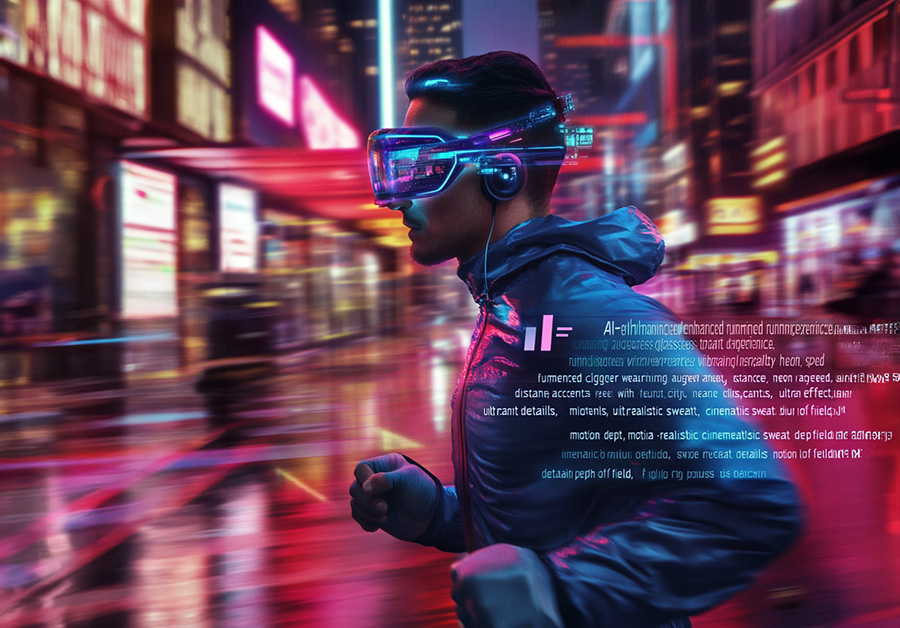What if your next personal trainer was an algorithm?
Forget the guesswork and generic workout plans—Artificial Intelligence is stepping into the gym with you. Whether you’re chasing gains, training for a marathon, or just trying to outpace your smartwatch, AI is reshaping the way we approach fitness.
Artificial Intelligence (AI) is transforming the fitness industry by redefining how people exercise, track progress, and optimize their health. With AI-powered tools, workouts are no longer one-size-fits-all; they are now adaptive, data-driven, and uniquely tailored to each individual’s needs. AI is personalizing training regimens, offering real-time feedback through wearable devices, and even predicting injuries before they happen. From virtual personal trainers to AI-driven nutrition planning, technology is bridging the gap between fitness and science, making health goals more achievable than ever.
How AI-Powered Apps & Tools are Changing Fitness
For those unfamiliar with AI, it might seem like a complex concept, but its impact on fitness is simple to understand. AI is being used in different applications and tools to make exercise and nutrition more efficient and accessible. Here are a few ways AI is reshaping the fitness industry:
- Smart Fitness Apps: AI-driven applications like Freeletics and MyFitnessPal analyze user data to provide tailored workout and nutrition plans, adjusting them based on progress.
- Wearable Technology: Devices like WHOOP and Fitbit use AI to track movement, heart rate, and sleep patterns, providing personalized health insights.
- Virtual Coaches: Platforms like Mirror and Tempo bring AI-powered coaching into homes, offering real-time corrections and interactive training.
- Gamified Fitness: Apps like Zwift turn workouts into engaging, competitive experiences using AI-generated challenges.
- AI Nutrition Assistants: AI-powered tools like Nutrino create personalized meal plans by analyzing biometric data and user preferences.
Now that we’ve seen how AI-powered apps and tools are reshaping fitness, let’s dive into specific case studies and actionable ways AI is improving workout plans, nutrition, and overall health.
Personalized Workouts with AI-Powered Apps
Case Study: Freeletics
Freeletics is a popular AI-driven fitness app that creates personalized workout plans based on user data, including fitness level, goals, and feedback after each session. The AI algorithm continuously adapts these plans, ensuring users get the most effective routines tailored to their progress.
Impact
- Increased user retention by 30% due to dynamic, adaptive workout plans.
- Faster goal achievement for users through real-time adjustments and data-driven recommendations.
Prompt for AI-Powered Fitness Plan
“I want to create a personalized fitness plan tailored to my unique needs. Here’s some information about me:
- Age: [Insert age]
- Gender: [Insert gender]
- Height: [Insert height]
- Weight: [Insert weight]
- Fitness Goals: [e.g., weight loss, muscle gain, increased endurance, flexibility improvement, etc.]
- Current Fitness Level: [e.g., beginner, intermediate, advanced]
- Preferred Workout Types: [e.g., HIIT, strength training, cardio, etc.]
- Workout Environment: [e.g., home, gym, outdoors]
- Time Available for Workouts: [e.g., 30 minutes/day, 1 hour/day, etc.]
- Existing Health Concerns: [e.g., injuries, GERD, etc.]
- Preferred Diet Type: [e.g., vegetarian, non-vegetarian, keto, balanced, etc.]
- Food Preferences: [e.g., eggs, chicken, fish, nuts, etc.]
- Allergies/Intolerances: [e.g., lactose, gluten, etc.]
Can you create a 30-day fitness and diet plan based on this information? Please include details such as workout schedules, intensity, meal plans, and any specific recommendations for staying on track with my goals.”
Virtual Trainers for At-Home Fitness
Case Study: Mirror by Lululemon
Mirror combines AI with a sleek home workout device that acts as a virtual personal trainer. AI tracks user movements, provides feedback, and adjusts workouts to mimic in-person coaching. It also integrates biometric data from wearable devices for a holistic fitness experience.
Impact
- Enabled users to replicate gym-quality workouts at home, especially during the COVID-19 pandemic.
- Improved customer satisfaction through accurate tracking and interactive classes.
Wearable Technology for Real-Time Insights
Case Study: WHOOP
WHOOP uses AI to analyze data from wearable devices, focusing on metrics like sleep, recovery, and strain. Its AI provides actionable insights, such as when to rest or push harder, based on physiological data.
Impact
- Athletes using WHOOP have reported significant performance improvements by optimizing recovery and workload balance.
- Helped reduce injuries by predicting overtraining and suggesting rest days.
AI in Nutrition Coaching
Case Study: Nutrino (Acquired by Medtronic)
AI-powered Nutrino analyzes dietary habits, fitness goals, and biometric data to create personalized meal plans. It integrates with fitness apps and wearables to adjust nutrition advice in real time.
Impact
- Improved adherence to diet plans by 50% due to hyper-personalized suggestions.
- Users experienced better fitness outcomes through the alignment of nutrition and training.
Prompt for AI-Enhanced Nutrition Plan
“I need a personalized diet plan to help me achieve my fitness and health goals. Here are my details:
- Fitness Goal: [e.g., weight loss, muscle gain, energy improvement, etc.]
- Caloric Target: [Insert number of calories, e.g., 1700 kcal/day]
- Dietary Preferences: [e.g., high-protein, low-carb, balanced, Mediterranean, etc.]
- Foods I Enjoy: [e.g., chicken, fish, berries, avocados, nuts, seeds, etc.]
- Foods to Avoid: [e.g., processed foods, sugary snacks, etc.]
- Health Concerns: [e.g., GERD, high cholesterol, etc.]
- Cooking Skills: [e.g., beginner, intermediate, advanced]
- Available Time for Meal Prep: [Insert time, e.g., 15 minutes, 30 minutes, etc.]
Can you provide me with a 7-day meal plan, including recipes, snack options, and grocery lists? Ensure the plan aligns with my goals and preferences.”
Gamification and Engagement Through AI
Case Study: Zwift
Zwift blends AI with gaming to make indoor cycling and running more engaging. The app uses AI to create virtual challenges, competitive races, and real-time feedback to keep users motivated.
Impact
- Increased workout frequency and intensity for users by turning fitness into an immersive experience.
- Built a community of millions, fostering motivation through social interaction and AI-driven challenges.
Prompt for Gamified Fitness Engagement
“I want to gamify my fitness journey to make it more engaging. Here are some details about me:
- Fitness Preferences: [e.g., indoor cycling, running, strength training, etc.]
- Technology Available: [e.g., wearable fitness tracker, smartphone, etc.]
- Motivational Factors: [e.g., competition, rewards, community challenges, etc.]
- Goals: [e.g., increase weekly exercise frequency, run a 5K, etc.]
Can you recommend apps, tools, or AI solutions that combine gamification with fitness tracking? Also, suggest a step-by-step plan to integrate these into my daily routine for maximum motivation.”
Future Implications of AI in Fitness
The integration of AI in fitness isn’t just about convenience; it’s about unlocking human potential. AI will continue to:
- Refine personalization: Deeper insights from biometric data will allow hyper-customized fitness programs.
- Enhance accessibility: AI can democratize fitness, providing high-quality coaching at a fraction of the cost.
- Advance preventive health: AI can predict and prevent injuries by monitoring patterns in user behavior and physiology.
Takeaway
AI is transforming the fitness landscape, providing unprecedented opportunities for personalization, engagement, and performance improvement. From smarter workout plans to gamified experiences, these innovations are empowering individuals to achieve their goals while making fitness more accessible and fun.
Editor’s Note on Accuracy & Limitations:
We strive for accuracy, and the information presented in this article reflects current applications of AI in fitness. Tools like Freeletics, WHOOP, MyFitnessPal, and Zwift are indeed leveraging AI to personalize training, recovery, and motivation. However, some specific claims—like exact improvement percentages or real-time injury prediction—require nuance. While promising, many AI tools are still evolving and may not yet deliver the full precision some marketing materials suggest.
As always, we encourage a healthy mix of curiosity and skepticism. Use this information as a guide—not gospel—as you explore the world of AI-powered wellness.


